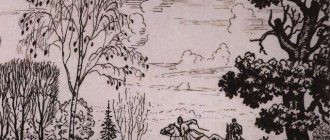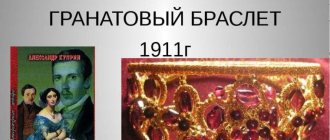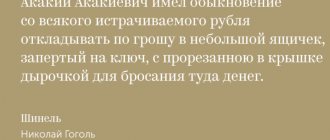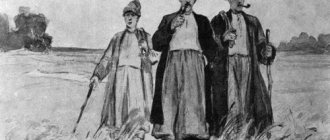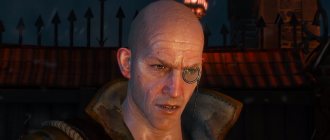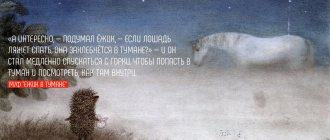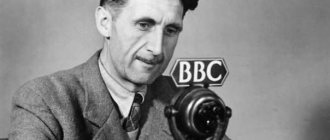The purpose of writing the novel was to portray a “positive person,” although the writer himself was well aware of how difficult this task was.
There are many characters in the novel, but the most important among them is Prince Mouse. Three more are considered among the central ones: Nastasya Filippovna, Rogozhin Parfen and Epanchina Aglaya.
Among his heroes, only Myshkin is able to resist the capitalist world. But his moral strength is not enough to win, and he dies, unable to get out of the swamp, where they envy beauty and think only about profit and money.
Idiot - Dostoevsky quotes
Return to content
Pass us by and forgive us our happiness.
The law of self-destruction and the law of self-preservation are equally strong in humanity!
Lately, he too has been tormenting me: it was all natural, people were created to torment each other. Hippolytus
A fool with a heart and no mind is just as unfortunate a fool as a fool with a mind and no heart. Lizaveta Prokofyevna Epanchina
In abstract love for humanity, you almost always love only yourself. Nastasya Filippovna
Scoundrels love honest people... Gavrila Ardalionovich Ivolgin
You can tell a child everything—everything; I was always amazed by the thought of how little big children, fathers and mothers even know their own children? There is no need to hide anything from children, under the pretext that they are small and that it is too early for them to know. What a sad and unhappy thought! Prince Myshkin
Shestov L.I.: Dostoevsky and Nietzsche. Chapter IX
Preface Chapter: 9Notes
Back forward
Chapter IX
This struggle defines the entire work of the gr. Tolstoy, in whose person we have the only example of a man of genius who strives at all costs to compare with mediocrity, to become mediocrity himself. Of course, he fails. No matter how much he protects himself from the demands of his nature, it always expresses itself in him in violent and impatient outbursts. It seemed that in “War and Peace” he had already summed up the final conclusions and observations of his life. Everything he saw was definitely and firmly fixed in its place. And, most importantly, it is placed in such a way that, in general, the picture turns out to be encouraging and pleasing to the eyes, despite the fact that nothing is forgotten in it from those horrors of life that undermine people’s trust in their neighbors and the Creator. Prince Andrei died a painful death after a painful life, Petya Rostov was shot in the head by the French, the old countess before our eyes turns into a semi-idiot, Count Ilya Andreevich, having ruined his children, imperceptibly disappears, Sonya becomes a hanger-on, etc. But all this is so arranged in the picture, which not only does not weaken, but also enhances the overall invigorating impression. Dostoevsky could never comprehend the secrets of this side of Tolstoy's art. He imagined that a menacing shout, a commanding tone, decisiveness in affirmation, a few virtuous and holy words were always able to cope with the anxiety living in his own and in general in every human heart. So, for example, in “The Idiot,” where Prince Myshkin plays the role of a peace-making spirit, the following most characteristic dialogue occurs. After a night reading in the garden, Ippolit, doomed to death, meets Prince Myshkin in the garden and asks him a “question”. “Tell me straight,” he asks, “what do you think is the best way for me to die? So that everything turns out more virtuous, that is? Well, you say? How do you like this “question”?! According to the meaning of the novel, Prince Myshkin is always supposed to be different; he must be able to understand everything and emerge victorious from the most difficult situations. But, in this case, one must think that Dostoevsky, arranging a meeting for him with Ippolit, simply decided to laugh at his hero. Is it possible, for other purposes, to ask questions that, no matter how hard you try, you will never answer, not only intelligently, but even in any way satisfactorily? And the form of the question is: “So that everything turns out virtuously”! It seems as if Dostoevsky, out of the old habit of an underground man, suddenly had an irresistible desire to show the tongue of his own wisdom. And exactly, if Ippolit’s question is impudent, then Prince Myshkin’s answer is outrageous. Here it is: “Pass us and forgive us our happiness,” said the prince in a quiet (!) voice.” Hippolytus laughed right in his eyes. Dostoevsky did not have the determination to force the poor boy to bow before the shameless holiness of the prince. And the quiet voice, which is always especially powerful in such cases, did not produce any effect, nor did the magic word “excuse me”... Oh, no, Dostoevsky did not know, did not know at all, how to use dark colors. He imagined that it was enough to come up with a pious title for the picture, and its plot would be justified. Or, better said, he wanted to achieve a real answer to Hippolytus’s question, and not just give the public a work of art. Gr. Tolstoy is a different matter. He is deeply convinced that there is no answer, and therefore, it is necessary not only for readers, but also for himself to be separated from reality by artistic fiction. War and Peace is a masterpiece in this sense. Everything is calculated there: there both the small and the significant have their place. Daring questions are not forgotten, but they not only do not confuse the reader, but even seem, when reading, to be resolved. No one comes to the dying Prince Andrei in a quiet voice to report their insight into the secrets of the world. On the contrary, those around are silent and only silent, frightened and destroyed by the mystery and menacingness of the event. Prince Andrei is given all the honors that one departing for another world could wish for, and no one yet dares to irritate him with their exactingness. And this is the only true, sure way to thoroughly, forever bury an untimely dying person. Gr. Tolstoy adopted it from ordinary everyday practice. More sorrow, humility, tears, solemnity - all this opens the way to a new life, all this, in the end, will reconcile with any loss. But gr. Even this is not enough for Tolstoy. He sends his dead off to another world in such a way that they can no longer have any significance for the survivors. For this purpose, he does not even disdain to use Schopenhauer’s philosophy, slightly modified in accordance with the requirements of artistic creativity. Prince Andrei, dying, does not turn into “nothing” - no; he only returns back to the womb from which he came. Only individuality is lost, but it is so lost that even some time before death, everything living, even his own son, becomes completely alien and indifferent to him. This is purely Schopenhauer’s “immortality of the soul” in the depiction of gr. Tolstoy has an unusually calming and encouraging effect on survivors. Death is an awakening from life... “And relative to the duration of life, it did not seem to him (Prince Andrei) slower than awakening from sleep relative to the duration of the dream.” The given lines are taken from gr. Tolstoy almost literally from “The World as Will and Idea”, like the whole theory about death. This is weird. Gr. Tolstoy, generally speaking, does not like borrowing, but this time he makes an exception. Schopenhauer's view seemed very much in line with the needs of the moment. He promises, of course, not real immortality, that is, immortality not for the dying, but for those who remain alive. But who will think about the dead! Let them rest peacefully in their graves - and let the living enjoy life. Therefore, death must be considered not from the point of view of those leaving, but from the point of view of those remaining on earth. In this sense, the image of gr. Tolstoy is the height of perfection. It seems as if you have reached the limits of human knowledge, it seems that one more step - and the great secret of life will be revealed to you. But this is an optical illusion. In fact, just the opposite: everything has been done here to ensure that the mystery remains unsolved forever. Death is presented as something completely different from life, and therefore completely incomprehensible to the living. Prince Andrei, dying, loses his human individuality, which, gradually dissolving and blurring, drowns in something completely different than everything we can imagine. This other thing, this Ding an sich or “will”, in any case, something of Kantian-Schopehauer origin, is the “immortality” awaiting man. For the living, such a grandiose horizon is an interesting sight. A dying person will not give anything for such immortality. The last songs of Heine, by the way, the beloved poet of the gr. Tolstoy, a curious person can find out a lot about this: the great German lyricist knew how to be very truthful and sincere. But gr. Tolstoy does not want to mix himself with people who have no earthly hopes. Prince Andrei's business is not his own business. Prince Andrei just needs to be escorted out of life in a decent manner. It is necessary to bury it deeper into the ground and pile a huge stone on the grave so that the dead man cannot get up and disturb the night's sleep of the living - or, even better, he needs to be turned into Ding an sich. This is the task of Tolstoy’s art, this is the meaning of Kant’s idealistic philosophy: all the disturbing questions of life must be transferred in one way or another into the realm of the unknowable. Only then will that peace come on earth, which people, once frightened by a ghost, value above all else in life. In Kant this is not yet so noticeable; his anxiety was still of a purely theoretical, abstract nature. Its ghost was only Hume's skepticism, which threatened to undermine faith in the apodicticism of science. But gr. Tolstoy faced a different kind of skepticism: an abyss opened up before him, threatening to swallow him, he saw the triumph of death on earth, he saw himself as a living corpse. Seized with horror, he cursed all the highest demands of his soul, began to learn from mediocrity, from the middle, from vulgarity, truly feeling that only from these elements it is possible to erect that wall that, if not forever, then at least for a long time will hide the terrible “truth” from eyes " And he found his “Ding an sich” and his synthetic judgments a priori, that is, he learned how to get rid of everything problematic and create firm principles by which a person can live. I believe that no one will dispute the legality of this “that is”: after all, what is essential in a priori judgments is not their origin, but their apodictic nature, i.e., universality and necessity. And more will be discussed about Ding an sich in the future.
| Preface 9 Notes Back Forward |
Quotes from the novel The Idiot
Return to content
He did not expect that his heart would beat with such pain. Prince Myshkin
For a limited ordinary person, for example, there is nothing easier than imagining himself as an extraordinary and original person and enjoying this without any hesitation.
You can’t love perfection; perfection can only be looked at as perfection, right?
In her pride, she will never forgive me for my love, and we will both perish.
Inventors and geniuses almost always at the beginning of their career (and very often at the end) were considered by society to be nothing more than fools - this is the most routine remark, all too well known.
It is better to be unhappy, but to know, than to be happy and live... in fools. Ippolit Terentyev
Compassion is the main and, perhaps, the only law of existence of all humanity.
Quotes from the main characters of the novel
(Artist Alena Dergileva, illustration Dostoevsky “The Idiot”)
The prince suffers from epilepsy from an early age. He received treatment abroad for almost five years. Having almost defeated the disease, Myshkin decides to return home.
He says little about himself:
“I think that I have neither talents nor special abilities; on the contrary, because I am a sick person and did not study correctly.” Myshkin .
“I know that I’m stupid too.” Myshkin .
But the author endows him with philosophical thinking. He expresses wise thoughts on various topics:
“The main, most severe pain may not be in the wounds.” Myshkin .
“He talks about what can cause the most severe pain.”
“Beauty is difficult to judge. Beauty is a mystery." Myshkin .
— The prince talks about beauty and its power.
“How well the children themselves notice that their fathers consider them too small and not understanding anything, while they understand everything.” Myshkin .
“The prince believes that you shouldn’t hide anything from children, that they not only understand everything, but can also evaluate what is happening more correctly than adults.”
He appears in St. Petersburg empty-handed. He has no money, no home, no wealth. But then “happiness” falls on him, and this in a society where money is placed above all else. He starts giving everything away.
The prince believes in God, but over time he loses it, and his lack of faith led him to crime.
“I wasn’t in love,... I... was happy otherwise.” Myshkin .
— He evaluates his past life, before prison.
“And there is a great deal of life to be found in prison.” Myshkin .
“He doesn’t lose his presence of mind even there.”
Idiot - quotes
Return to content
Only those who have no wit speak the truth. Ferdyshchenko
There are women who are only suitable as mistresses and nothing else. Gavrila Ardalionovich Ivolgin
... You blush, this is a trait of a beautiful heart. Prince Myshkin
If I had the power not to be born, I probably would not have accepted existence on such mocking conditions. Ippolit Terentyev
However, if you don’t love a person, why wish him bad things, right? Ippolit Terentyev
Typicality is like ordinaryness, which never wants to remain what it is, and at all costs wants to become original and independent, without having the slightest means of independence.
Know that there is such a limit of shame in the consciousness of one’s own insignificance and weakness, beyond which a person can no longer go and from which he begins to feel enormous pleasure in his very shame. Ippolit Terentyev
Advantages of the work “The Idiot” by F.M. Dostoevsky
Initially, the book captivates with its intriguing title. The main idea of the novel “The Idiot” is moral. The writer consistently and clearly reveals the heroes of the work. This book will make a significant contribution to the awareness of moral values. Perhaps some readers will reconsider their views on life.
Strong and vibrant characters
The clash of views, life positions, points of view reveals the personal qualities of each of the heroes. F.M. Dostoevsky paid great attention to the psychological portraits of the characters. The writer admires women. The author vividly and in detail describes the images of the fair sex. Some heroes are opposed to each other. We gradually learn the problems that concern each of the characters in the novel.
A work about each of us
F.M. In his novel, Dostoevsky presented several bright collective images in which every reader can find himself. The reader can pay attention to the strengths and weaknesses of the characters, and then discover them in himself. This is not to say that the novel “The Idiot” is a completely fictional story. These are works about our society and the people who surround us.
The book is relevant at all times
The novel "The Idiot" has no time frame. This book is not about generations gone by. The characters described in the book are among us. Issues raised by F.M. Dostoevsky, are relevant at all times. Honor and conscience, betrayal and meanness, love and hatred. In his work, the writer tried to answer eternal questions.
All human vices are exposed in the work
People often do not notice negative character traits in themselves. Many of us think they are perfect. However, this opinion is in most cases wrong. With the help of his characters F.M. Dostoevsky exposed human vices. Prince Myshkin seems to love absolutely everyone. He never deceived or betrayed anyone. But society does not accept such a person. Prince Myshkin is not like those around him. Some characters are mired in squabbles and scandals. Heroes lie, hiding behind necessity. But often the characters pursue selfish goals. Prince Myshkin is not like that. He is the complete opposite of such heroes. There is a clash of views, where human vices are shown. People prefer to hide their weaknesses. However, they do not always succeed. The work “The Idiot” gives a person the opportunity to look at the world around us from a different perspective. Perhaps there are people among us who should not be trusted.
Unpredictability of the plot
The ending of the novel “The Idiot” is completely unpredictable. Many readers try to guess the ending of the book from the first pages. But the storyline is twisted in such a way that it is almost impossible to do this. Events and colorful characters captivate the reader. Despite the considerable volume of the work, the book is read quickly and easily. F.M. Dostoevsky gradually introduces us to the characters. The writer gives the reader the opportunity to form his own opinion regarding each character.
Conclusion
It is worth noting that the work “The Idiot” by F.M. Dostoevsky is not an acquired taste. If the book is “hooked”, then it is read in one breath. This work “opens your eyes” to many life problems. The reader is given a chance to look at himself from a different perspective. The author’s correct and easy style helps to assess the significance of the work in the modern world. F.M. Dostoevsky uses various artistic means to convey the images of characters truthfully and honestly.
The book “The Idiot” is definitely not suitable for those who just want to “kill” time. The work does not belong to the genre of entertainment literature. This is a deeply philosophical novel that talks about true values. Book by F.M. Dostoevsky is considered one of the most controversial in the world. The Russian person is lucky that he can get acquainted with the work in his native language of the great writer.
Disadvantages of the work “The Idiot” by F.M. Dostoevsky
The novel “The Idiot” has practically no downsides. Many readers believe that the book by F.M. Dostoevsky is ideal. However, a careful reading may reveal some shortcomings. Although for most readers, they are more advantages than disadvantages.
Misunderstanding of some of the issues raised by the author
The book “Idiot” by F.M. Dostoevsky - for readers of conscious age. Most teenagers will not understand the problems described by the author. The life experience gained by a person will help to understand the intricacies of the destinies of the heroes, to understand the motives of their actions and actions.
Conflicting impressions of characters
A striking example is Nastasya Filippovna. It seems that a smart and beautiful woman should be hasty. However, the heroine is deeply unhappy. The reader's image of Nastasya Filippovna evokes pity. Why is life unfair to the heroine? The woman was never able to accept herself. Fate turned out to be too cruel to her. Despite the positive character traits, society rejected the heroine. Nastasya Filippovna never knew the joy of family life. Her life turned into a gray, miserable existence. F.M. Dostoevsky did not give the heroine a chance to find the meaning of life and find out her purpose. Readers never found out why Rogozhin, who loved a woman, killed her? What were his motives? The author did not provide any explanations.
Some moments are too long
There are moments in the book that you just want to skim through. However, there are very few of them. The work contains a lot of dialogues that are interesting to readers. They reveal the inner world of the heroes, revealing their hidden feelings and emotions. Some protractedness of the narrative may “put off” the reader. But this rarely happens. In most cases, the novel “The Idiot” is easy and relaxed to read.
